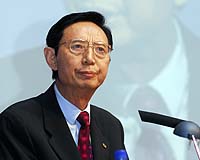| . |  |
. |
Beijing (AFP) Oct 14, 2009 Leaders from Russia, China and four Central Asian nations on Wednesday pledged to work together to coordinate their responses to the global economic crisis. Russian Prime Minister Vladimir Putin, host Chinese Premier Wen Jiabao, and leaders from four ex-Soviet countries -- Kazakhstan, Kyrgyzstan, Tajikistan and Uzbekistan -- also agreed their top finance officials would meet by year's end. The six had gathered for a meeting of the Shanghai Cooperation Organisation (SCO), a regional security grouping dominated by Moscow and Beijing, and seen by some Western critics as a way to counter US influence in Central Asia. Representatives from India, Iran, Mongolia and Pakistan also joined the talks at Beijing's Great Hall of the People, as the four countries have SCO observer status. "This document will create good opportunities. It will allow us to secure coordination of anti-crisis measures," Putin said before the adoption of an agreement outlining the crisis response and a post-crisis strategy. "The crisis has become a catalyst for reform of the international financial system. Our organisation should take part in this." Wen said the leaders had agreed to "vigorously develop exchanges and cooperation in the areas of trade, energy resources, agriculture, transport, communications, culture, health, environment, and product quality control, and to improve economic competitiveness and our capability to prevent risks". Wen announced that Beijing would "fully implement" a plan to offer 10 billion dollars in loan support for member states, first announced by President Hu Jintao at an SCO summit in Russia in June, Xinhua news agency reported. "We will take actions to oppose trade and investment protectionism and work to advance trade between member states as well as the economic and social development of member states," the premier said. Hu, who met with the leaders after the SCO talks, praised the grouping's effectiveness in addressing the economic downturn, as well as other regional and international challenges, Xinhua news agency said. "Currently the international situation is complex and changing... with more unstable and unclear elements affecting the region's security and development," Hu said. "To effectively face every global challenge, we must work to strengthen the establishment and cooperation of the SCO." Russian and Kazakh officials said the leaders had agreed that their finance ministers and central bank chiefs would meet in Almaty before year's end. "The SCO is increasingly focusing on concrete activities in the area of economic cooperation," Russian Deputy Foreign Minister Alexei Borodavkin told reporters. "If earlier the SCO was largely an organisation for maintaining security, then today it's obvious that the global financial crisis forces SCO members and observers to pay increasing attention to the economic component of this structure's activities." Borodavkin said the situation in Afghanistan -- but not Iran's disputed nuclear programme -- had been discussed. Members also agreed to set up a special fund for joint energy, infrastructure and telecommunications projects. The SCO grew out of a regional effort in the mid-1990s to reduce military forces along common borders. It later came to involve anti-terrorism efforts and cooperation in the economic and energy fields. SCO members possess 17.5 percent of the world's known oil reserves and nearly half the natural gas supplies, according to a 2007 study published by the Stockholm International Peace Research Institute. "The attractiveness of the SCO is growing. An ever-increasing number of countries want to join our projects," Kazakh Prime Minister Karim Masimov said. Share This Article With Planet Earth
Related Links The Economy
 China's billionaires rise to 130 despite global crisis
China's billionaires rise to 130 despite global crisisBeijing (AFP) Oct 13, 2009 Car battery tycoon Wang Chuanfu topped a new list of China's 1,000 richest people released Tuesday, which has 130 dollar billionaires in an emphatic declaration of the Asian giant's economic arrival. Most of the super-wealthy on the Hurun Rich List, unlike Wang, made their fortunes in the property and stock markets -- the focus of Beijing's massive government stimulus efforts over the past ... read more |
|
| The content herein, unless otherwise known to be public domain, are Copyright 1995-2009 - SpaceDaily. AFP and UPI Wire Stories are copyright Agence France-Presse and United Press International. ESA Portal Reports are copyright European Space Agency. All NASA sourced material is public domain. Additional copyrights may apply in whole or part to other bona fide parties. Advertising does not imply endorsement,agreement or approval of any opinions, statements or information provided by SpaceDaily on any Web page published or hosted by SpaceDaily. Privacy Statement |